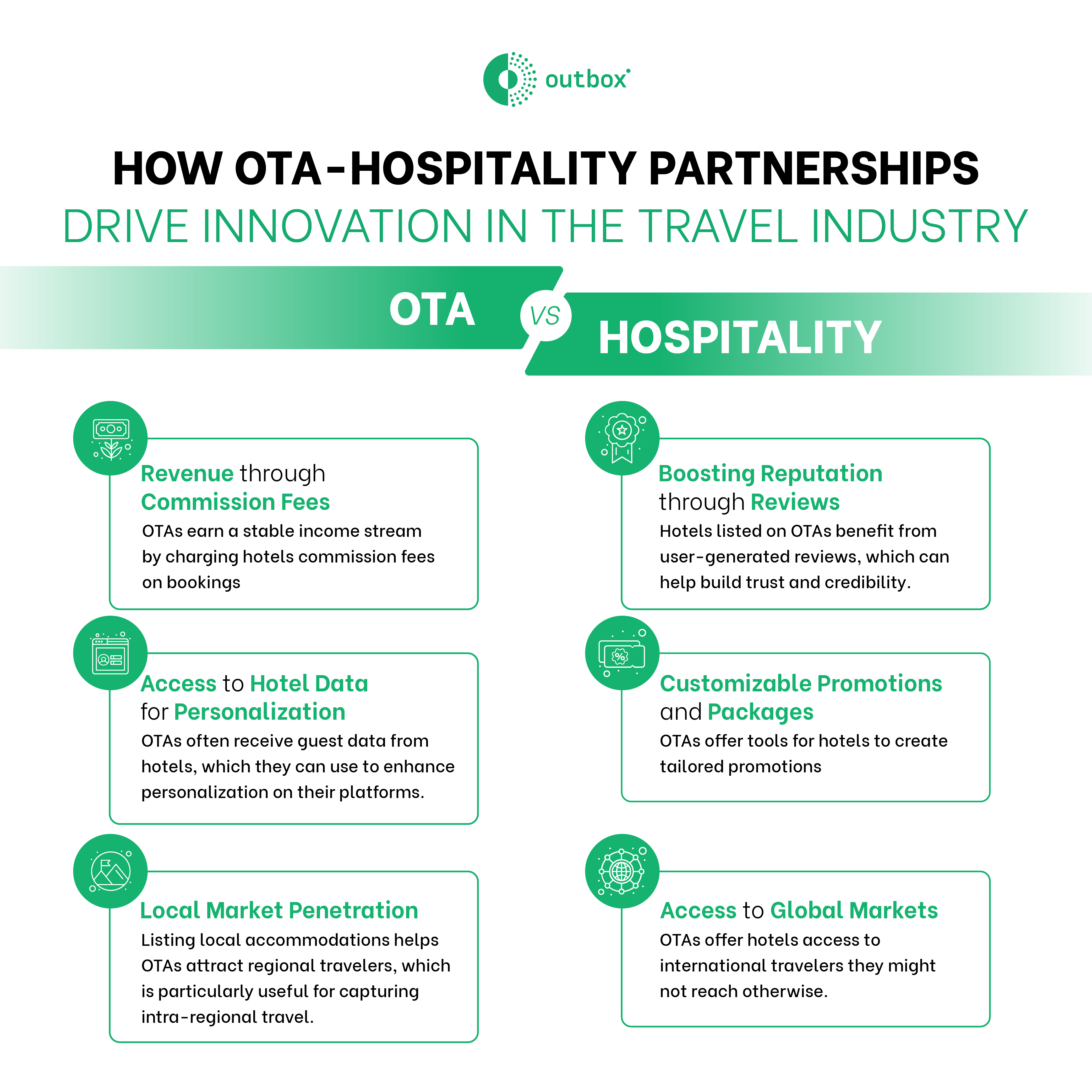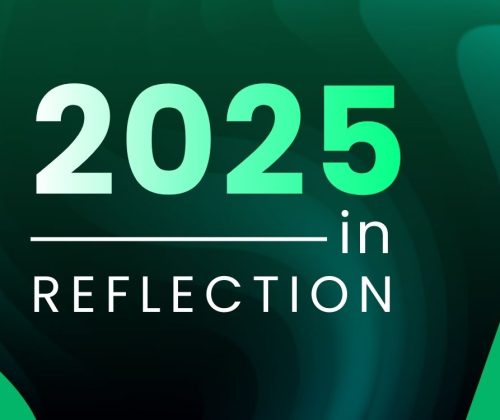The tourism industry has witnessed a remarkable recovery this year, with online travel agencies (OTAs) and the hospitality sector playing pivotal roles in this expansion. OTAs like Trip.com, Agoda, and Booking.com have transformed the way travelers plan and book their trips, making it more convenient than ever. According to the Outbox Asia Hotel Brand Survey, 24.9% of travelers now choose to book their hotel stays through OTAs among 6 available channels. This shift reflects the growing reliance on OTAs to facilitate seamless travel experiences for a global audience.
A successful partnership between OTAs and hotels offers significant advantages to both parties. Hotels benefit from the extensive reach of OTAs, allowing them to fill room inventories, manage loyalty programs, and provide personalized experiences to travelers. In turn, OTAs benefit by offering a wider range of accommodations and enhancing their offerings. This blog delves into how these partnerships help improve the overall traveler experience thus fostering growth for both industries.
How OTAs Benefit from Hospitality Partnerships
Revenue Through Commission Fees
OTAs generate a stable and substantial income by charging hotels commission fees for each booking made through their platform. These fees allow OTAs to maintain their vast infrastructure and marketing capabilities, which are crucial for driving consistent traffic and bookings to their hotel and other partners.
Access to Hotel Data for Personalization
Another significant advantage OTAs gain is access to valuable guest data. Hotels share information such as booking preferences, stay history, and guest demographics, enabling OTAs to personalize the travel experience for consumers. This data-driven personalization enhances user engagement on OTA platforms and results in higher conversion rates.
Local Market Penetration
OTAs benefit from listing local accommodations, which is particularly useful for capturing the growing intra-regional travel trend, especially in Asia. By offering regional travelers a range of domestic hotel options, OTAs deepen their penetration into local markets, making their platforms a go-to resource for travelers looking for convenience and variety.
Trip.com, one of Asia’s leading OTAs, penetrated local markets in Southeast Asia by adding a range of smaller, regional hotels to its platform. This allowed them to capture regional travelers looking for convenient and affordable accommodations. For example, in Thailand, the rise of domestic travel post-pandemic helped Trip.com establish itself as a go-to platform for local hotel bookings, driving more regional traffic to both the platform and the hotels.
How Hospitality Benefits from OTA Partnerships
Boosting Reputation through Reviews
Being listed on popular OTAs comes with the benefit of user-generated reviews, which can significantly boost a hotel’s reputation. Potential guests rely heavily on reviews when deciding where to stay, and a positive review can greatly increase bookings. This user feedback loop helps hotels build trust and credibility, which is especially important for smaller or newer hotels seeking to establish themselves.
Customizable Promotions and Packages
OTAs offer robust tools that allow hotels to create tailored promotions and packages to target specific traveler segments. Whether it’s discounts for longer stays or bundled experiences, this level of customization helps hotels attract a variety of customers and encourages higher booking rates.
Access to Global Markets
One of the most significant benefits for hotels is the ability to reach a global audience that might have been inaccessible through traditional marketing channels. OTAs invest heavily in search engine optimization (SEO), digital advertising, and retargeting strategies, which help hotels reach international travelers and expand their market reach.
Shangri-La Hotels, known for its luxury properties, partnered with Expedia to access international travelers, especially those from North America and Europe. Expedia’s global reach allowed Shangri-La to tap into new markets that would have been difficult to penetrate with its direct marketing efforts. As a result, Shangri-La saw an increase in bookings from international travelers who discovered the brand through Expedia’s search engine rankings and advertisements.
Challenges in OTA and Hospitality Collaborations
While the benefits of OTA-hotel partnerships are clear, they also come with challenges:
High Commission Fees
One of the most pressing challenges hotels face when partnering with OTAs is the high commission fees. These fees typically range between 15% to 30% per booking, depending on the OTA and the agreement in place. For smaller hotels and independent properties, these fees can significantly erode their profit margins, particularly in highly competitive markets where pricing must be kept low to attract bookings.
This financial burden is even more pronounced in markets where there is a high demand for discount travel. In such cases, hotels often resort to offering lower rates to remain competitive on OTAs, which further tightens margins after commissions are applied. Without strategic planning, hotels can find themselves in a situation where the volume of bookings increases, but overall profitability remains stagnant or even declines.
Maintaining Competitiveness
Another major challenge is the potential dilution of a hotel’s brand identity. Many hotels become overly dependent on OTAs to fill rooms, which can undermine their own direct marketing efforts. With so many hotels listed on an OTA platform, it can be difficult for individual properties to stand out or maintain their unique brand identity, particularly when OTAs display competing hotels side by side with little differentiation other than price or guest ratings.
While OTAs provide visibility, they also reduce the direct relationship hotels have with their guests. In a traditional booking scenario, the hotel owns the guest interaction from start to finish. However, when bookings come through OTAs, the relationship between the hotel and the guest is mediated by the platform, limiting the hotel’s ability to foster direct loyalty. This indirect relationship means that guests may become more loyal to the OTA platform rather than the hotel itself, leading to a long-term challenge in customer retention.
Balancing OTA Relationships with Direct Bookings
Many travelers appreciate the convenience of OTAs, but they also expect more personalized offers and better deals from booking directly through the hotel’s website.
According to Outbox data, 56,5% of Asian travelers still prefer direct bookings, especially if the hotel provides incentives like discounted rates, loyalty points, or exclusive perks that OTAs do not offer. However, the challenge arises when hotels are overly reliant on OTAs for bookings and fail to invest in their direct booking channels, leaving them vulnerable to market fluctuations and OTA policy changes.
Outbox’s Best Practices for Successful Partnerships
To navigate these challenges, hotels and OTAs can adopt best practices that optimize their collaborations:
Mitigating the Impact of High Commission Fees
Hotels, particularly larger chains or those with consistent booking volumes, may be able to negotiate lower commission fees with OTAs by leveraging performance metrics such as higher booking conversion rates or long-term partnership history. In exchange, hotels may offer OTAs more favorable room allocations or provide exclusive promotional packages for OTA users. For instance, by offering additional room availability during peak seasons and participating in special promotional campaigns through Booking.com, Hilton was able to secure a reduced commission rate while maintaining strong visibility on the OTA’s platform.
Hotels can also create incentives for direct bookings by offering exclusive perks or loyalty benefits that are not available through OTAs. Marriott International successfully launched a “Look No Further” best rate guarantee, which promised guests the lowest room rates when booking directly through the hotel’s website. This campaign helped reduce the hotel’s dependence on OTAs by incentivizing travelers to book directly through Marriott’s own platform, ultimately cutting commission costs.
Strengthen Unique Brand Value Through Direct Channels
To differentiate themselves from the competition on OTA platforms, hotels should focus on strengthening their unique brand value through personalized marketing, storytelling, and direct engagement with guests. This involves highlighting the hotel’s unique features, experiences, or services that are not easily conveyed through OTA listings. Hotels can also use their own digital platforms—such as social media, blogs, and newsletters—to build a strong brand narrative that resonates with their target audience.
Boosting Retention and Customer Engagement
In an increasingly competitive hospitality landscape, loyalty programs are a critical factor in retaining guests and ensuring repeat business. Best practices suggest that hotels and OTAs should develop joint loyalty programs that offer travelers benefits for booking through either channel. This helps bridge the gap between OTA bookings and direct bookings, ensuring that both the hotel and the OTA can maintain strong relationships with travelers.
For example, a hotel chain may offer OTA members a free breakfast during their stay, but also promote their own loyalty program to these guests upon check-in, encouraging them to sign up for future direct bookings. This strategy creates a win-win scenario, where both the hotel and the OTA retain a strong relationship with the guest without creating competition between channels.
Conclusion
In conclusion, partnerships between OTAs and the hospitality industry are essential for the continued growth of the travel ecosystem. By working together, OTAs and hotels can enhance traveler experiences, optimize revenue, and build stronger brand reputations. As the travel landscape continues to evolve, these collaborations will play an increasingly important role in driving innovation and sustainable growth.






